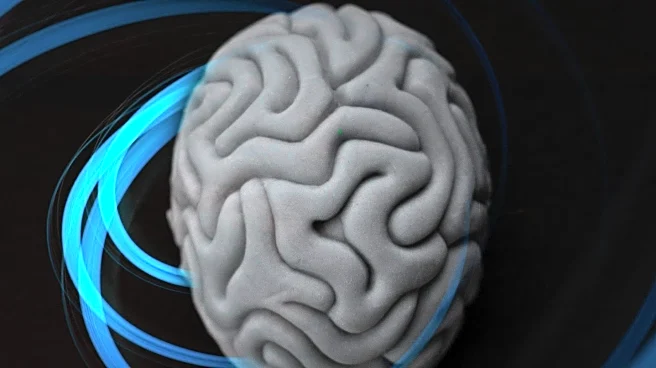What's Happening?
Scientists at the University of California San Francisco (UCSF) have identified a protein, ferritin light chain 1 (FTL1), as a significant factor in brain aging. The study, published in Nature Aging, reveals that FTL1 is an iron-associated protein that impairs cognition by affecting the hippocampus, the brain region responsible for learning and memory. In experiments with mice, older mice exhibited higher levels of FTL1, leading to fewer brain cell connections and diminished cognitive abilities. Conversely, reducing FTL1 levels in older mice resulted in improved memory and increased nerve cell connections, effectively 'rejuvenating' their brains. The research suggests that modulating this protein could potentially reverse some effects of brain aging.
Why It's Important?
This discovery holds significant implications for understanding and potentially treating age-related cognitive decline and neurodegenerative diseases such as Alzheimer's. By identifying FTL1 as a 'pro-aging neuronal factor,' the research opens new avenues for therapeutic interventions aimed at reducing or reversing cognitive impairments associated with aging. The findings could lead to the development of treatments that enhance cognitive function in the elderly, thereby improving quality of life and reducing healthcare costs associated with age-related cognitive disorders. The study's support from major institutions like the National Science Foundation underscores its potential impact on public health and aging research.
What's Next?
Future research will likely focus on exploring the mechanisms by which FTL1 affects brain aging and how its modulation can be safely and effectively applied in humans. Clinical trials may be necessary to determine the feasibility of translating these findings from mice to human patients. Additionally, the study may prompt further investigation into other proteins and factors involved in brain aging, potentially leading to a broader understanding of the aging process and new strategies for intervention.
Beyond the Headlines
The ethical implications of reversing brain aging are profound, raising questions about the societal impacts of extending cognitive longevity. If successful, such treatments could alter perceptions of aging and retirement, influence healthcare policies, and shift demographic trends. Moreover, the research highlights the importance of interdisciplinary collaboration in addressing complex biological challenges, combining insights from neuroscience, genetics, and gerontology.









